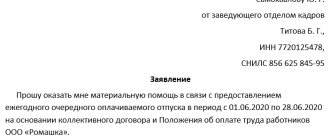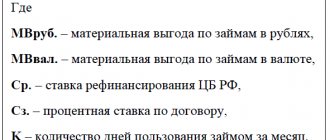With which employees can a liability agreement be concluded? What consequences do the employer face if he ignores the list of categories of employees with whom the specified contracts can be concluded?
First of all, we note that the financial liability of a party to an employment contract arises for damage caused by it to the other party as a result of its culpable unlawful behavior (actions or inaction), unless otherwise provided by the Labor Code of the Russian Federation or other federal laws (Article 233 of the Labor Code of the Russian Federation). First of all, financial liability will arise if the employee is at fault for causing damage.
Why is the agreement necessary?
In accordance with Part 1 of Art. 244 of the Labor Code of the Russian Federation, the employer has the right to enter into an agreement on financial liability with the cashier. The purpose of drawing up the document is to ensure that the employer can compensate for the damage caused to him by the employee. If such a document is missing, preserving valuables belonging to the employer will be problematic, because in the event of losses, it is the agreement that makes it possible to establish guilt and subsequently bring the employee to financial responsibility. The subordinate bears both full (full compensation for losses) and limited (partial compensation) liability.
The employer, in turn, is obliged to guarantee the employee the preservation of the property entrusted to him, timely payments and the right to work.
In order to demand compensation for losses incurred in full, a document is drawn up, the form of which is established by Resolution of the Ministry of Labor dated December 31, 2002 No. 85.
Legal framework of liability
The general obligation of the Parties that have entered into an employment relationship, in the presence of guilt and other significant circumstances (illegality, actual damage, direct and indirect intent), to compensate each other for damage to property is enshrined in Section XI of the Labor Code of the Russian Federation (in the text abbreviated as the Labor Code of the Russian Federation).
The personal financial liability of employees is enshrined in the Code in a separate chapter, number 39.
The “classical” limits of an employee’s obligation to cover losses arising through his fault have limits equal to his average monthly earnings.
This is a general rule enshrined in Art. 241 of the Code, for the position of cashier there is an exception: the boundaries of personal liability for this staffing position are expanded to the maximum, and amount to the entire amount of damage caused to the employer.
The fact that some employees may be persons fully responsible for the safety of the property entrusted to them is established in Article 242 of the Labor Code of the Russian Federation.
At the same time, the second paragraph of the above-mentioned norm establishes a strict limitation on imposing the full amount of financial responsibility on the employee, providing for it only in cases expressly established by law.
A closed list of such situations is established by Article 243 of the Labor Code of the Russian Federation: the cashier, as an official who accepts material assets, is responsible for their shortage (clause 2, shortage of assets entrusted on the basis of a written agreement or received under a one-time document).
Analyzing the provisions of the norms, an agreement on the full individual financial responsibility of the cashier is another important optional requirement established by the Code (at the discretion of the employer!) for the employee to perform specific job duties.
What is the basis for financial liability?
It occurs when the following conditions are met:
- direct actual damage caused to the injured party;
- the action (inaction) that caused the damage is illegal;
- a clear connection between the action and the damage caused;
- the fault of the person who violated the contract.
The actual existence and extent of damage, and other above-mentioned conditions must be proven by the victim.
A party to an agreement may be held liable if all conditions exist simultaneously.
Accountant's responsibility
As for the responsibility of an accounting employee who is not a chief accountant under an employment contract, it occurs on the basis of the norms and sections of Art. 241 of the Labor Code of the Russian Federation and is limited to the amount of one monthly salary (salary for the period from the first calendar day of the month to the last calendar day of the month is considered).
At the same time, do not forget about the exceptions that were described above. Each type of established violation leads to one of the types of liability (material, criminal, administrative or disciplinary).
If you intentionally commit a financial crime or conspire with another company employee to obtain material property, criminal prosecution may be opened. At the same time, the chief accountant is obliged to control the entire process of processing financial transactions of an ordinary accounting employee, and if illegal actions are detected, both may face liability (including criminal liability).
How is collection from a cashier carried out?
The position of “cashier” is included in the list of jobs for which the employer enters into a written agreement with the employee on full financial responsibility. If an employee does not agree to sign a sample agreement with a cashier on financial responsibility, and the duties of working with valuables are included in the main job function, his actions are regarded as a refusal to perform labor duties (Resolution of the Armed Forces of the Russian Federation No. 2 of March 17, 2004).
The cashier bears full financial responsibility for the preservation of valuables and for damage that could arise either as a result of intentional actions or negligent attitude to functions.
If the amount of losses does not exceed the average monthly earnings, the amount of funds is recovered by order of the manager, made no later than a month from the date of establishment of the actual damage. Before management makes a decision, an inspection is carried out by a specially created commission. The cashier provides written explanations of the situation; in case of his refusal, a report must be drawn up (Article 247 of the Labor Code of the Russian Federation). If the collection procedure is violated, the employee will be able to appeal the employer’s actions in court.
If the cashier does not agree to compensate for losses voluntarily, or the month required for drawing up the collection document has expired, or the amount of damage is higher than the average monthly earnings, the employer will be able to compensate for the damage in court. Appeal to court is possible within one year from the moment the damage was discovered.
The employee has the right to compensate for the losses incurred voluntarily, and, with the consent of the parties, to compensate them in installments. In this case, the cashier gives the employer a written receipt for voluntary compensation for losses. With the consent of the employer, the employee may, in compensation for damage, transfer property of equal value or eliminate defects.
Damage is subject to compensation regardless of the fact that the employee is held liable.
Limits of liability
An employee's financial liability can be limited or full.
The limits of an employee’s financial liability are established by Article 241 of the Labor Code of the Russian Federation and are limited by the amount of his average monthly earnings, unless otherwise provided by the Labor Code of the Russian Federation or other federal laws. What does this mean in practice?
If the amount of damage exceeds the employee’s average monthly earnings, then the employee is obliged to compensate only that part of it that is equal to his average monthly earnings (for example, decision of the Venevsky District Court dated May 28, 2018 No. 2-168/2018).
At the same time, the rule on limited financial liability of an employee within the limits of his average monthly earnings is applied in all cases, except for those in respect of which the Labor Code of the Russian Federation or other federal law directly establishes a higher financial liability of the employee, in particular full financial liability.
Full financial liability for the full amount of damage caused is assigned to the employee in certain cases (Article 243 of the Labor Code of the Russian Federation). For example, when an employee is charged with financial liability in full for damage caused to the employer during the performance of the employee’s job duties, intentional infliction of damage, causing damage while under the influence of alcohol, drugs or other toxic substances, as a result of the employee’s criminal actions established by a court verdict, as a result administrative violation, if established by the relevant government body (clause 4 of the Resolution of the Plenum of the Armed Forces of the Russian Federation dated November 16, 2006 No. 52, letter of the Rostrud of the Russian Federation dated October 19, 2006 No. 1746-6-1).
That is, with full financial liability, the employee must fully compensate the company for the entire amount of damage caused (Articles 242 and 243 of the Labor Code of the Russian Federation).
Termination of an employment contract after damage has been caused by a former employee does not entail his release from financial liability. By law, the employee is obliged to compensate the employer for direct actual damage caused to him (Article 238 of the Labor Code of the Russian Federation). In this case, lost income (lost profits) cannot be recovered from the employee.
How the contract is concluded
A sample contract for the liability of a seller or cashier can be concluded:
- according to the established standard form (Resolution of the Ministry of Labor No. 85);
- with employees included in the list established by the Resolution;
- between the institution and the cashier (or a group of employees);
- in two copies, each of which is signed by the head of the enterprise or his deputy and subordinates (team). One copy is kept in the institution, the second is in the hands of the employee.
Any changes are made to both copies.
The administrative document of the manager appoints a person responsible for storing agreements and making changes to them.
Agreements on individual and collective financial liability cannot be signed simultaneously with one employee.
The document is valid from the date of signing. If an employee is transferred to another job, a new agreement should be concluded with him. If the employee does not agree, the manager has the right to offer him another job according to his qualifications. If there is no vacancy, an employee can be dismissed in accordance with the established procedure.
Cashier in fact, not by position
Often an employee combines several professions, that is, performs several job functions. For example, a salesperson in a clothing store may also be a cashier. The organization's accountant can also be a cashier.
If the organization’s staffing table approves the position of cashier-salesperson, cashier-controller, then the labor function includes both the responsibilities of a cashier and other responsibilities. In this case, one labor contract is concluded with the employee, which states that the employee is hired for a job that, in fact, involves combining labor functions.
Since in the Qualification Directory of Positions of Managers, Specialists and Other Employees, approved by Resolution of the Ministry of Labor of Russia of August 21, 1998 No. 37, there are no positions of salesperson-cashier, cashier-controller and other similar positions, then the organization, approving such a labor function, must also develop and a job description for such an employee, which defines responsibilities and establishes qualification requirements.
In this case, when concluding an employment contract, an agreement on full financial responsibility is immediately concluded.
If an employee was initially hired for a job that does not involve performing such duties, and he was additionally charged with this job function, then the sequence of actions is as follows.
First of all, an additional agreement to the existing employment contract is drawn up, which must indicate that the worker is entrusted with, and he assumes, the duties of a cashier. The period during which a person will perform additional work, its content and volume are established by the employer, also with the written consent of the employee. The amount of additional payment for combining positions is also established.
Secondly, an order is issued to assign the duties of a cashier in a combination manner.
Thirdly, an agreement on full financial responsibility is concluded.
And only after all of the above is the acceptance and transfer of the cash register formalized.
In this case, the employee must be familiarized with the job description by signature.
IMPORTANT!
Regardless of how the combination of cashier functions is formalized, it should be remembered that the employer must establish only labor relations with such employees. Otherwise, the organization will not have the right to enter into an agreement on property obligations with the employee.
Professional responsibilities of the employee
A cashier-salesperson is a universal specialist, as he deals not only with cash and valuables, but also with people and equipment.
The cashier seller is obliged to:
- Serve customers in the cash register.
- Work with cash documents, cash, reconcile cash payments and the actual availability of funds, conduct an inventory, hand over funds for collection.
- Understand not only financial issues, but also be able to identify a technical malfunction of a cash register (hereinafter referred to as the cash register), and also correct it if possible.
- Monitor price tags on goods from the sales floor with database data in the cash register, be able to advise the buyer, and be a conduit between the store administration and its client.
The range of responsibilities is very wide and requires the employee not only to have knowledge and skills, but also to guarantee the employer that all the valuables with which the specialist will work will remain intact. Below we will look at a document that allows you to protect the employer from losses intentionally caused by the employee.
To pay or not to pay after dismissal
If an employee is dismissed, he is obliged to fully compensate for the damage caused, as determined by the court. The main thing is to meet all deadlines and complete the documents correctly.
How to bring to justice, watch the video:
To preserve property and funds, you need to complete all documents in a timely manner and follow the recommendations of this article. The state has given the employer the right to resolve the issue independently - within the limits of the average monthly salary or by going to court if all documents are in order. Be carefull.
Top
Write your question in the form below
Determination of Compensable Damage
The amount of assessed damage during the performance of his work activity by an accounting employee is assessed in accordance with the provisions of Art. 246 Labor Code of the Russian Federation. General conditions for determining the amount of damage:
- The amount of damage is taken into account based on the market value of the damaged property (amount);
- Depreciation of property is taken into account
- If the accountant does not agree, then it is possible to involve an independent appraiser
If the damage was caused in the form of a breakdown of this or that equipment or other corporate property, then the amount is estimated solely taking into account depreciation and wear and tear for the period that this company owns the property (based on the market value of similar purchase offers on the secondary market) .
In what cases is financial responsibility specified in an employment contract?
There are positions in which the employee bears full financial responsibility without concluding a separate agreement. For accountants and deputy directors, an additional clause is provided for this in the employment contract. But this is provided that their work involves direct contact with money and valuables. Otherwise, this clause will not have legal force and the money will be returned only in the amount of the average monthly earnings of the culprit.
The general director of the enterprise is by default the financially responsible person. Even if he does not have a separate agreement concluded and the above-described point is not stated in the employment contract.





